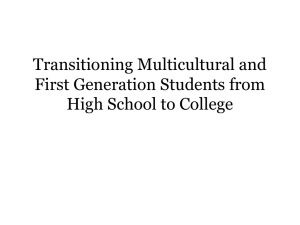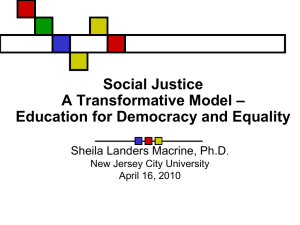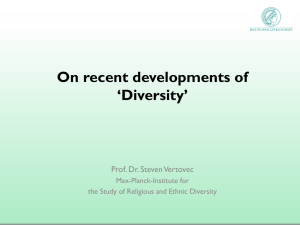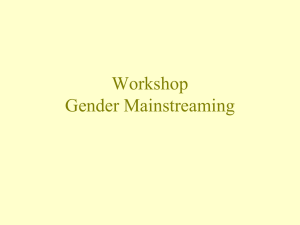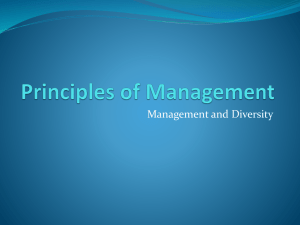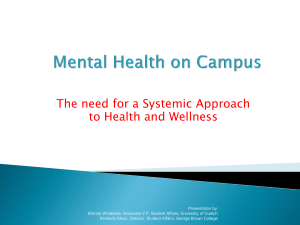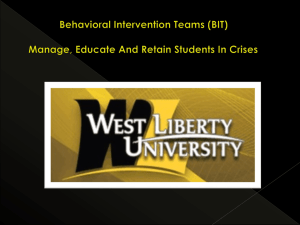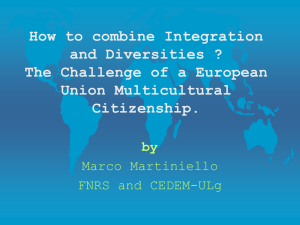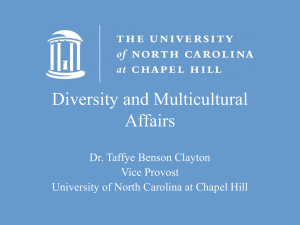Power Point display about the Academic Affairs Diversity Task Force
advertisement
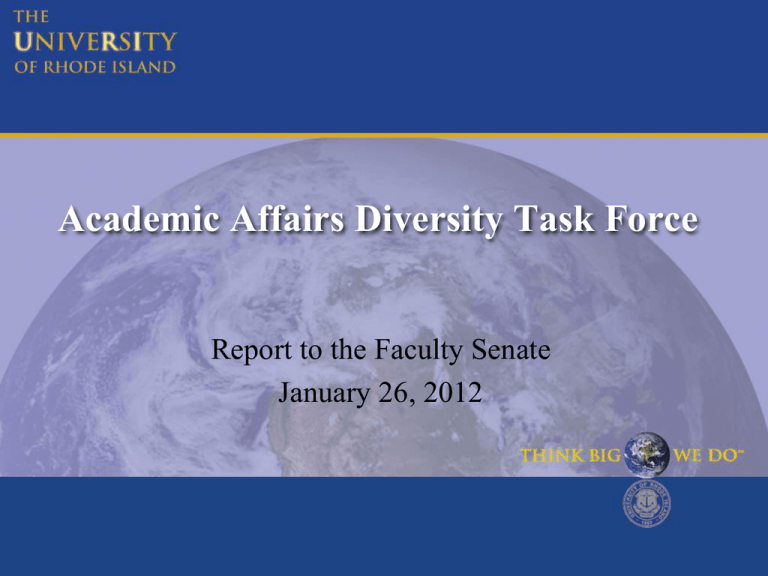
Academic Affairs Diversity Task Force Report to the Faculty Senate January 26, 2012 Presentation Outline History of the Diversity Task Force in Academic Affairs Charge of the Task Force Major Initiatives (subcommittees) – – – – Development of Multicultural Competencies Faculty Development Multicultural Enhancement Fund Multicultural Faculty Apprentice Fellowship Future Initiatives Current Committee Members History • Long history of Diversity and Equity work on campus • Student protests: – 1992 Black Student Leadership Group – 1999 Brothers United for Action – 2010 GLBT Center students Take over of Taft Hall 1992 Black Student Leadership Group First DeMaio Scholars 2001 Point 9 in the negotiated agreement with President Carothers LGBT protest at Library 2010 History of Diversity Efforts on Campus • • • • • 1998 New Multicultural Center opened 1999 President’s Commission on the Status of Women 2003 New Women’s Center opened 2004 Student Affairs Diversity Committee began 2005 Formation of the President’s Commission on the Status of Students, Staff, and Faculty of Color • 2007 Formation of Equity Coalition • 2008 Equity Council formed Equity Coalition--2007 • Strategic Plan of the President’s Commission on the Status of Women called for forming an Equity Coalition • Initial coalition included representatives from – – – – – President’s Commission on the Status of Women, President’s Commission on the Status of People of Color, Affirmative Action Committee, Harassment Committee ADVANCE Equity Council The mission of the EC is to advocate, promote, and sustain diversity and equity throughout the entire University community • 30 members including representatives from all diversity organizations on campus and union liaisons. • 8 Faculty members—no faculty senate representation Equity Council Work on Structure for Diversity • Successfully advocated for a CDO: Search is underway • Diversity committees in each division: – Academic Affairs : Academic Affairs Diversity Task Force formed in 2009 • Diversity Committees in each College – Administration – Advancement – Student Affairs – Athletics Academic Plan, 2010-2015 Charting our Path to the Future Goal V: Ensure an Equitable and Inclusive Campus Community Ensure a campus climate that celebrates difference and creates a rich learning community built upon respect, inclusion, and understanding related to class, race, gender, sexual orientation, ability, religion, and culture. Charge “The Diversity Task Force of the Division of Academic Affairs is committed to promoting tolerance, respect, and equal opportunity with respect to learning and discovery within the University. The Task Force will promote a broad understanding and appreciation of diversity issues engendering in our selves and the faculty, staff, and students of the university the wisdom to listen to and respect voices and ideas different from our own.” http://www.uri.edu/provost/planning/diversity.html Goals of the Task Force • To raise consciousness about privilege, bias, and mutual respect in the URI community • To gather and use data on access, retention, institutional receptivity, and quality of experience to enhance the diversity of the URI community by promoting and supporting active recruitment and retention programs throughout the Division • To promote a welcoming and respectful community that encourages understanding and appreciation of difference • To lead efforts to ensure that the academic and co-curricular experiences of all students reflect understanding of multicultural perspectives and the value of diversity Major Initiatives: Multicultural Competencies • Ensure that all URI students develop knowledge, awareness, and skills in regard to diversity, equity, and multiculturalism • Provide foundation for individual transformation and the development of inclusive and pluralistic communities on campus and throughout the world • “Diversity” refers to disenfranchised/oppressed groups in U.S. society, including (but not limited to): class, race, ethnicity, gender, sexual orientation, religion, and physical/mental ability 1--Exposure/Awareness • Awareness of the meaning of diversity and multiculturalism, including legal and ethical aspects of affirmative action, prejudice, and discrimination • Awareness of identity formation and development, and how our own identities and those of others affect attitudes and behavior • Development of multidisciplinary appreciation of multicultural diversity and origins of American society as well as diverse cultures around the globe 2--Knowledge/Understanding • Knowledge and understanding of power structures, privilege, and explicit and implicit prejudice within American society, including within our University community • Knowledge and understanding of history and patterns of difference, discrimination, and oppression with regard to different groups within American society, and within our University community • Knowledge and understanding of the social construct of race and its social, political, economic, and behavioral consequences 3--Skills • Development of problem solving and analytical skills about diversity as a means of constructing action plans for addressing diversity issues in the community and resolving conflicts linked to difference • Ability to carry out meaningful cross-cultural discourse with people whose voices, experiences, and ideas are different from our own for the purpose of creating a shared vision of American and global society • Development of advocacy and change management skills for achieving social equity 4--Transformation Developing the capacity for deep understanding, reflection, and empathy with regard to the current and past experiences of marginalized groups at URI and across the nation, including issues of discrimination, injustice, and hate, and summoning the internal courage to confront such issues Multicultural Competence in the Curriculum • Endorsement by Task Force in May 2010 • One of the proposed goals and learning outcomes in the revision of the general education program • Subcommittee is focusing on ways to work with college and department curriculum committees to diffuse these competencies into the majors Major Initiatives: Faculty Development Development of workshops and training programs that help faculty develop awareness, knowledge, and skills related to diversity, multiculturalism, equity, and community Within the context of each college’s mission Within and among college diversity committees to develop and share ideas for strategies and actions Major Initiatives: Faculty Development January 2011: 2 days • Half-day workshops for three colleges: Human Sciences and Services, Pharmacy, and Nursing • Half-day workshop for college diversity committees May 2012: 1 day • To follow-up with Pharmacy, Nursing, and Human Science and Services on initiatives since previous workshop in January 2011 • Initiate work with the other colleges through faculty leaders and diversity committee members Multicultural Enhancement Fund • Small grants up to $3,000 available to faculty and staff: proposals due 12-1-11 • $15,000-$20,000 allocated from the Division of Academic Affairs • Proposals reviewed by Multicultural Enhancement Fund committee members • 21 proposals were submitted; 6 received awards Sample Topics for Proposals • Creating a new or modifying an existing course with a focus on application of culturally competent practices • Curricular mapping to identify and address gaps to meet accreditation standards • Strengthening college and department equity and diversity committees • Faculty mentoring a professional or student organization to augment their approach to multiculturalism and diversity Further Sample Topics • Conducting research with or assessing outcomes of outreach/services provided to underserved and vulnerable populations • Conducting research on such topics as: – The egregious impact of white hegemony at the individual and institutional levels – White privilege and white normativity – Internalized racism, sexism, heterosexism, ableism, ageism, and other forms of discrimination. • Evaluating the success or impact of programs/projects previously established to reduce inequities or address the needs of underrepresented populations. Funded Proposals • Measuring the Cultural Adaptability of Students Who Participate in International Experiences with J. Hazen White Fellows, Jennifer Audette, Physical Therapy and Rosaria Pisa, Sociology and Anthropology • Infusing Multicultural Content in a Psychology Course, Department of Psychology Task Force on Multiculturalism and Diversity • An Urban after School Intervention Program: Promoting Healthy Lifestyle in Overweight Minority Children and Adolescents, Furong Xu, Kinesiology • Dimensions of Diversity, Timothy W. Tierney, Information Technology Services • Increasing Retention of At-Risk Nontraditional and Adult Students, Tamara Bolotow, Feinstein Providence Campus • LGBT Faculty Fellows Program, Annemarie Vaccaro and Delores Walters, Human Sciences and Services Major Initiatives: Multicultural Faculty Apprentice Fellowship (MFAF) The goals of the MFAF Program are to Increase the diversity of the faculty at the University of Rhode Island Advance issues of diversity in research and teaching within academic programs at URI. MFAF Program Opportunities • Departments will participate in a competitive process for hiring a Multicultural Faculty Apprentice Fellow • One candidate per year will be supported for one academic year through the Provost Office. • There may be an opportunity for the Fellow to transition into a full-time faculty position in the department, contingent upon a favorable review. Elements of MFAF Program • Teach one course per semester • Pursue scholarly and/or creative interests • Sponsoring dept will offer – mentoring, – developmental opportunities, – presentation opportunities, – teaching assistance, – opportunities to engage in department governance Future Initiatives • Explore ways to provide incentives for faculty to become more involved in working on Goal V initiatives in the Academic Plan (i.e., ensuring an equitable and inclusive campus community) • Provide recommendations on recruitment and retention of diverse faculty to CED Office • Explore ways to focus on access, financial aid, retention, and graduation rates of diverse students, both undergraduate and graduate • Develop events on campus to raise consciousness and understanding about diversity and equity Members of the Task Force 2011-2012 • • • • • • • • • • • • Donald DeHayes, Provost and Vice President for Academic Affairs, Co-Chair Laura Beauvais, Vice Provost for Faculty Affairs, Co-Chair Alycia Mosley Austin, Director of Graduate Recruitment and Diversity Initiatives, Graduate School Dania Brandford-Calvo, Director, International Education and National Student Exchange Mary Cloud, Assistant Professor, Nursing Elizabeth Cooper, Professor, College of Business Administration Anita Derreza, Assistant Professor, Pharmacy Practice Robert Dilworth, Professor, Art and Art History Kyle Kusz, Associate Professor, Kinesiology Peter Larsen, Associate Professor, Library Joanne Lynch, Admissions Office Jasmine Mena, Assistant Professor, Psychology Members of the Task Force 2011-2012 • • • • • • • • • • • • Patricia Morokoff, Past Co-Chair, Equity Council and Professor of Psychology Marcia Morreira, Educator III, CELS-Continuing Education Center Annu Palakunnathu Matthew, Professor of Art and Art History Barbara Silver, Research Coordinator, Schmidt Labor Research Center Earl Smith, Assistant Dean, College of Arts and Sciences Delores Walters, Associate Dean, Human Sciences and Services Tammy Vargas Warner, Advisor in BIS Program, ASFCCE Charles Watson, Coordinator, College of Engineering/Minority Students Recruiting and Retention Raymond Watson, Executive Director, Mount Hope Neighborhood Association Cheryl Wilga, Professor, Biology Gerald Williams, Director, Special Programs for Talent Development and Past Co-Chair of Equity Council Karen Wishner, Professor, Oceanography Questions? Please contact Laura Beauvais (beauvais@uri.edu or x4341) if you want to join the task force Task Force Website: http://www.uri.edu/provost/planning/diversity.html
